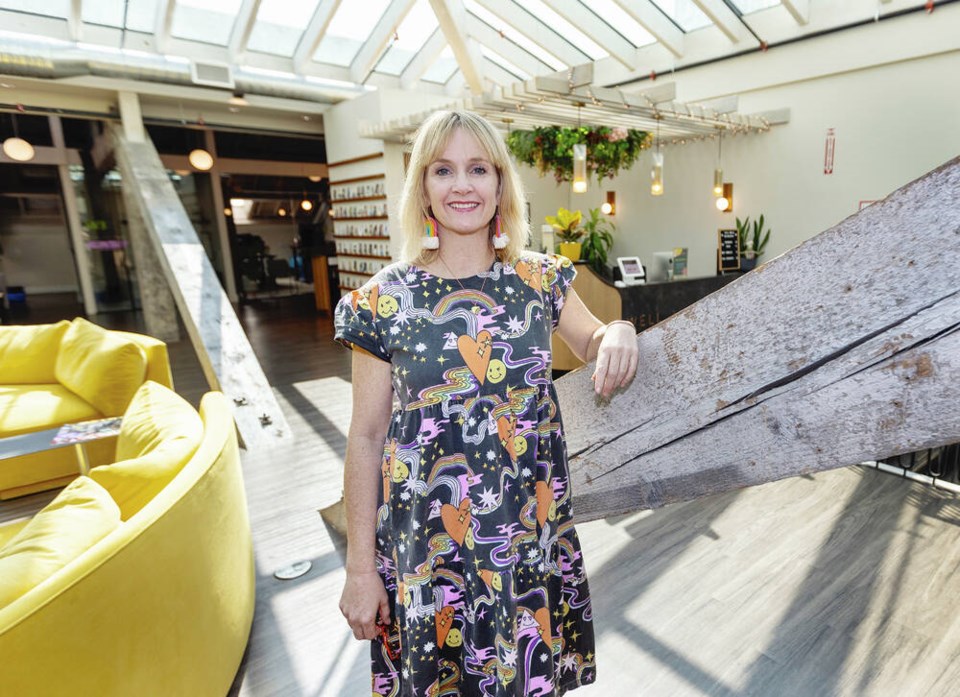Capital region residents and business owners who want to support reconciliation efforts can now pay into a new regional fund to send money to First Nations with no strings attached.
For renters, the recommended payment to the South Island Indigenous Reciprocity Trust is the equivalent of one per cent of their monthly rent. For homeowners, it’s about one per cent of property taxes per month — or 12 per cent a year — and for businesses it’s one per cent of profits, shares, time or product.
“A lot of the time, we start meetings or events and things like that with land acknowledgements,” said Sarah Reid, executive director of Reciprocity Trusts Society, which helps operate the trust.
“That’s kind of been status quo for the last 10 years or so — it’s sort of an empty way of speaking now.”
The City of Victoria instituted a similar system a year ago for homeowners to make voluntary payments equivalent to five or 10 per cent of their annual property taxes to the Songhees and Esquimalt nations.
The trust’s recommended payment amounts are based on a one per cent donation model popularized by 1% For The Planet, an environmental philanthropic movement.
Tessa McLoughlin, founder of Kwench, which provides work spaces and offices for entrepreneurs, said the initiative is a good way to take action and not just provide lip service.
“I’m able to run a profitable business, and so therefore I should be giving back to the land I’m using to run that business,” she said.
Saanich resident Susan Olding said she has already made her first “reciprocity payment.”
“I feel a responsibility to contribute to the Indigenous communities from whom these lands were essentially taken,” she said.
Abraham Pelkey, elected chief of the Tsawout Nation, said money that goes to the Tsawout could be used for land repatriation efforts, as well as smaller cost items such as funding travel to trans-national gatherings such as the Tribal Canoe Journeys.
Pelkey said that while money doesn’t solve everything, those who contribute are making an important statement.
“It’s people helping people,” said Pelkey. “I believe that’s what true reconciliation looks like.”
Reid said the idea for Reciprocity Trusts came from friends and family who would ask what they could do for First Nations in their own city.
The organization is a non-profit arm of Reciprocity Research, a social enterprise that works with remote First Nations across B.C. and Northern Alberta with environment assessment processes, impact-benefit agreement negotiations and other work that is needed when an industry or large-scale project is proposed in rural Indigenous territory.
Reciprocity Trusts aims to bring that kind of work into the context of a city.
“Our tagline is all around decolonizing your backyard, and it’s really looking at what it takes to start decolonizing the culture of home and private property,” Reid said, adding that the biggest impact to Indigenous lands in urban areas has been the private property system.
In the past few years, more than 800 people across B.C. have pledged to contribute, Reid said. The organization is working to turn those pledges into contributions.
The South Island Indigenous Reciprocity Trust names all 10 Crown-recognized First Nations with interests in the capital region as its beneficiaries: T’Sou-ke Nation, the Lekwungen people of the Esquimalt and Songhees Nations, the WSÁNEĆ communities of Tsartlip, Tsawout, Tseycum, Malahat and Pauquachin First Nations, as well as the Sc’ianew (Beecher Bay) First Nation and Pacheedaht First Nation.
The regional approach is in part an acknowledgement of how interconnected these places are, Reid said.
“For example, my home is in Fernwood in the City of Victoria. But my water comes from the Sooke Reservoir and T’Sou-ke territory, and my waste goes up to the landfill in WSÁNEĆ territory,” she said. “So even though my post stamp of home is in one neighbourhood, I have impacts beyond that.”
How the money will be distributed will be decided in a trustee meeting in October. Reciprocity Trusts will present formulas that will take into account geography and population, in addition to blended models that could incorporate both factors with a percentage of the funds equally distributed.
Reciprocity Trusts has said that 10 per cent of trust payments will go toward covering the organization’s costs.
Each nation can appoint a trustee through a band council resolution, Reid said, adding that she expects more nations to be on board before the next meeting. Currently, Jeanine Cooper is the Tsartlip Nation trustee and Josh Handysides is the interim trustee for Malahat Nation.
Other nations that have previously expressed interest in the project include Songhees Nation, T’Sou-ke First Nation and WSÁNEĆ leadership council, which at the time represented three nations on the Saanich Peninsula.
The trust is designed so that funds are disbursed every calendar year and are wholly governed by the nation trustees, Reid said. The society will also publish annual reports to show where the money has been used.
Naomi Devine, chair of the Reciprocity Trusts Society, said the initiative came from many years of discussion and work with Indigenous nations. It was important to “move at the pace of trust” with its First Nation partners, she said.
“We weren’t looking to rush this,” Devine said. “We were looking to do this right.”
Reciprocity Trusts Society said it is using the South Island as a pilot and model for future trusts. It is planning two more trusts, one for the Lower Mainland and one for the Central Kootenay and East Kootenay regional districts.
>>> To comment on this article, write a letter to the editor: [email protected]



